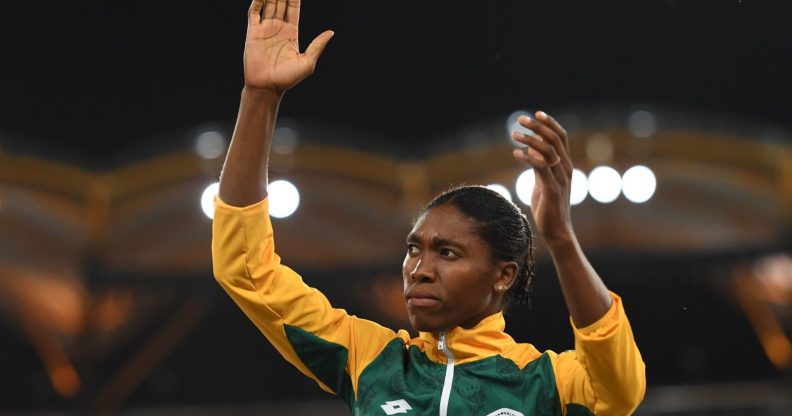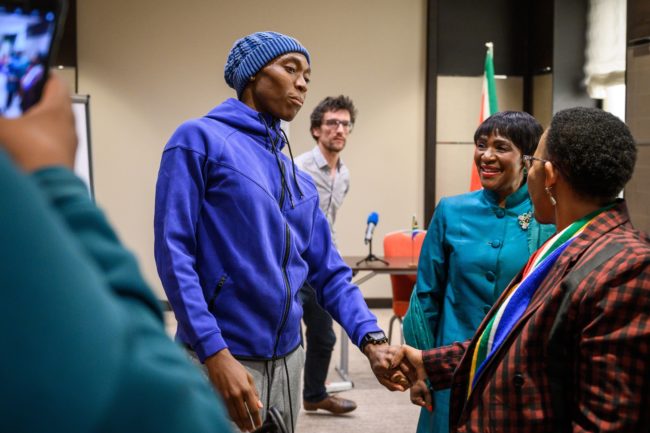Caster Semenya receives support after losing testosterone case

South Africa’s Caster Semenya (Getty)
Messages of support are pouring in for gold medallist Caster Semenya after the runner lost an appeal on May 1.
The Court of Arbitration for Sport (CAS) ruled against the gold medallist who challenged the implementation of rules which will limit the testosterone levels of female athletes. The landmark ruling comes after a long and bitter dispute over proposed rules by the International Association of Athletics Federations (IAAF) last year.
The CAS ruling stated: “DSD Regulations are discriminatory but the majority of the panel found that such discrimination is a necessary, reasonable and proportionate means of achieving the IAAF’s aim of preserving the integrity of female athletics in the Restricted Events.”
Under the regulations, the IAAF rule that female athletes diagnosed with a condition called difference of sexual development (DSD), will have to undergo testosterone restrictions. The UN has previously condemned such treatment as an “unnecessary, humiliating and harmful medical procedure.”
In reaction to the ruling, the South African three-time world champion said: “For a decade the IAAF has tried to slow me down, but this has actually made me stronger. The decision of the CAS will not hold me back. I will once again rise above and continue to inspire young women and athletes in South Africa and around the world.”
The decision to side with the IAAF angered many supporters of Semenya, who has naturally high levels of testosterone and will now be forced to have it reduced.
Caster Semenya has support from the South African government
South Africa’s minister for sport Tokozile Xasa released a statement supporting the star athlete on social media.
“We have always felt these regulations trample on the human rights and dignity of Caster Semenya and other women athletes,” the statement said,
“You remain our Golden Girl, what you have done for our people and girls is enormous,” Xasa’s message added, “you have flown our flag high, you have united a nation and inspired a rural girl. For that we thank you Mokgadi.”
Some critics of the ruling have also pointed out the specifically targeted nature of the regulation.
The ruling will only be valid for women who compete in distances between 400m and 1 mile, of which Semenya competes in, and the regulation is only targeted at women.
Some people pointed out that Semenya may have been under more scrutiny because of her ethnicity, gender, and sexuality. While others pointed out that swimmer Michael Phelps “has biological advantages that helped him with swimming,” and no one stopped him.
https://twitter.com/stavvers/status/1123546588515794945
“It’s worth noting she’s a proud queer woman; here she is with her wife,” one tweet read, “I don’t doubt that some of the ‘masculinity’ criticisms come out because she’s gay.”
Sooo Caster Semenya has to be medicated to continue participating in sport, but Ian Thorpe's size 17 flipper feet weren't chopped in half to make it fair for everyone else in swimming? 🤔https://t.co/4Jr4u6GgHG
— Zing Tsjeng (@misszing) May 1, 2019
While another said, “Ian Thorpe’s size 17 flipper feet weren’t chopped in half to make it fair for everyone else in swimming?”
In response to the decision, the IAAF said it was “grateful to the Court of Arbitration for Sport for its detailed and prompt response” and “pleased that the regulations were found to be a necessary, reasonable and proportionate means of achieving the IAAF’s legitimate aim of preserving the integrity of female athletics.”

Olympic champion Caster Semenya (C) meets South Africa’s Sports Minister Tokozile Xasa (R) and South Africa’s ambassador to the United Nations in Geneva, Nozipho Joyce Mxakato-Diseko (2nd from R), prior to a press conference to support Semenya’s hearing before the Court of Arbitration for Sport (CAS), on February 21, 2019 in Lausanne, western Switzerland.
(Fabrice Coffrini/AFP/Getty)
Semenya, 28, who has naturally high testosterone levels, will now have to undergo hormone therapy for at least six months before competing in any competition.
The rules stipulate those female runners with so-called DSD who compete in events between 400m and a mile will have to undergo the procedure.
What if she won?
It was suggested that, if the verdict went against the IAAF, athletics might have introduced an ‘open’ category that men and women could, in theory, compete in side by side, and a ‘protected’ category based on hormone levels, rather than gender.
Her legal team argued her advantages are no different from other genetic variations celebrated in sport, and that “her genetic gift should be celebrated, not discriminated against.”
They also maintained: “Her case is about the rights of women who are born as women, reared and socialised as women—[to] be permitted to compete in the female category without discrimination.”

